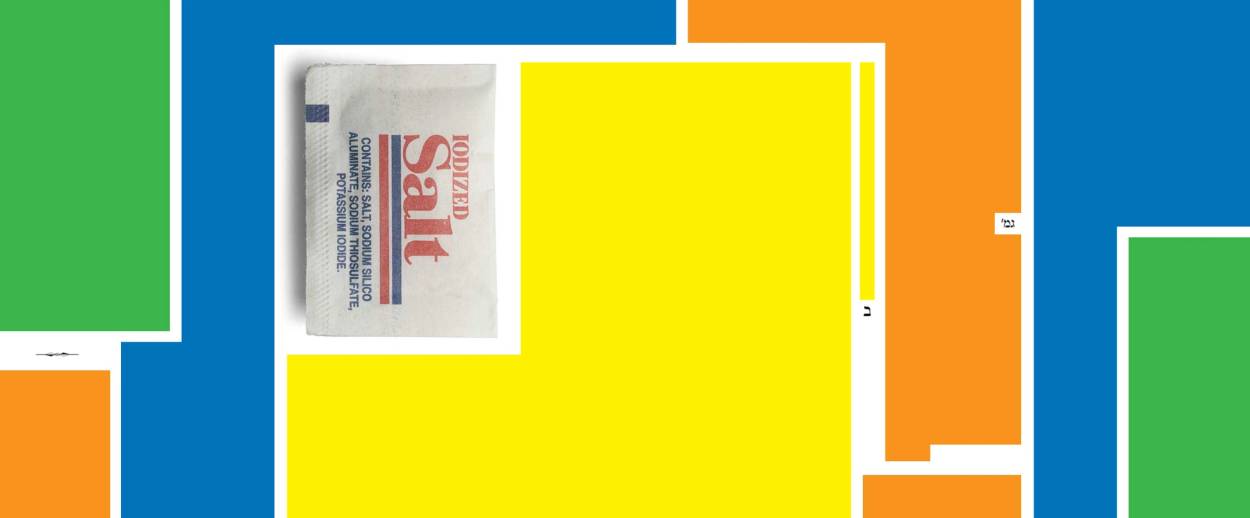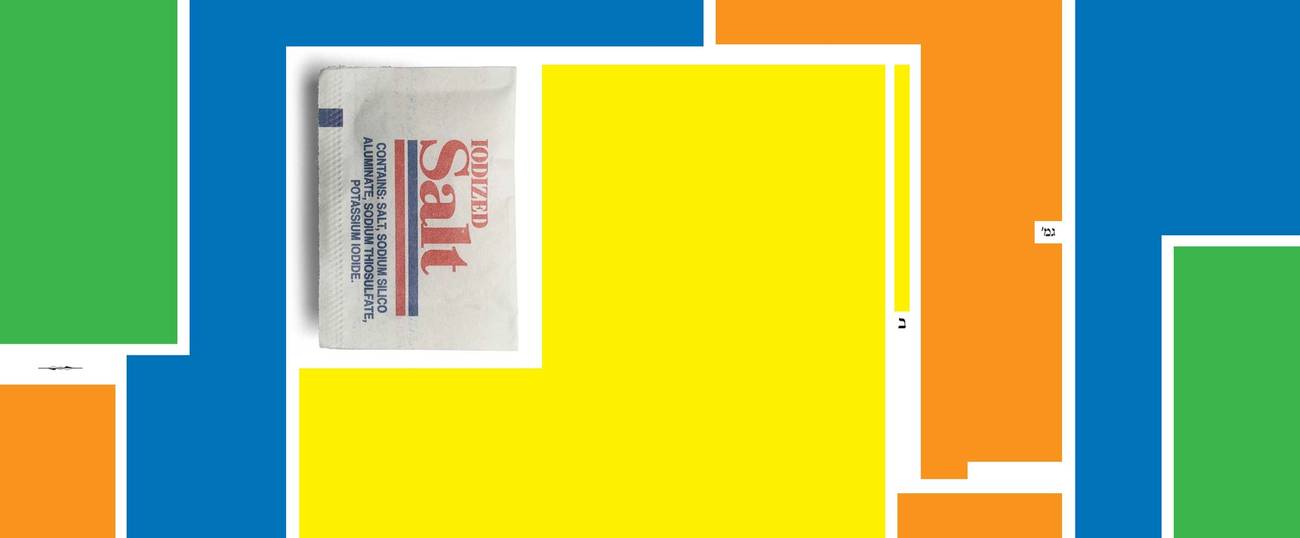Salt Bae
In this week’s ‘Daf Yomi’ Talmud study, the rabbis debate the use of the flavor-enhancing mineral in sacrificial offerings. Plus: Why wood needs to be sprinkled with salt before it is burned—over wood.




Literary critic Adam Kirsch is reading a page of Talmud a day, along with Jews around the world.
The list of ingredients for a meal offering is found in the Torah in Leviticus 2: “And when one brings a meal offering unto the Lord, his offering shall be of fine flour; and he shall pour oil upon it, and put frankincense upon it.” A little later, a third ingredient is mentioned: “And every meal offering of yours you shall season with salt; neither shall you suffer the salt of the covenant of your God to be lacking from your meal offering; you shall sacrifice salt with all your offerings.” Chapter Three of Tractate Menachot focuses on these side dishes, as it were, to the main course of flour: oil, frankincense, and salt.
The Torah seems to make it clear that all these items are required for a meal offering. Yet the mishna on Menachot 18a says otherwise: The only thing that is absolutely required to make a meal offering a fit sacrifice is the flour. “If one did not pour the oil onto the meal offering, or did not mix the oil into the meal offering … or did not add salt,” the offering is “fit,” the mishna rules. This doesn’t mean that the priest should omit the oil and salt, of course, but it does mean that if they are accidentally forgotten, the offering can still proceed without risking divine punishment. By contrast, an offering that is sacrificed with the intention of eating it at the wrong time is considered piggul, and it renders the person who offers it liable to the extreme punishment of karet, being “cut off” from God.
The Gemara immediately spots the contradiction between the Torah’s stringency with regard to salt and oil and the mishna’s leniency. “What does the mishna mean when it states that if one did not pour the oil on the meal offering it is fit?” (As usual, I am quoting the expanded paraphrase used in the English translation of the Koren Talmud, which makes the text much easier to comprehend. The original Aramaic simply says: “What did not pour?” It’s useful to remember that the verbal texture of the Talmud is terse, often to the point of obscurity.) “Doesn’t the verse write with regard to the pouring of the oil that doing so is indispensable?” So why do the tannaim, the rabbis of the mishna, say otherwise?
The problem of reconciling seemingly contradictory authorities is the Talmud’s favorite kind of challenge, and the rabbis work to find a way out of the impasse. What the mishna is referring to, the Gemara argues, is a case where the oil was indeed poured, but it was not poured by a priest. Instead, it was poured by the man who was bringing the offering to the Temple, who is an Israelite. Thus, what the mishna means to tell us is that the pouring of oil onto the meal offering is not one of the parts of the ritual that only priests can perform.
But Rabbi Shimon disputes this conclusion. According to him, “any priest who does not admit to the validity of the sacrificial rites has no portion in the gifts of the priesthood.” These rites comprise a long list, including the pouring of the oil for a meal offering, as well as the subsequent actions: “the mixing, the breaking, the salting, the waving, the bringing to the altar, the removal of the handful, and the burning of the handful upon the altar.” For Shimon, a priest who allows a non-priest to pour oil for a meal offering is implicitly scorning the validity of a sacrificial rite, which ought to disqualify him for the priesthood altogether.
Here is another contradiction, which calls forth another resolution, this time from Rav Nachman. “This is not difficult” (lo kashya), he says, using the standard formula for solving a problem that is, in fact, difficult. Shimon’s opinion is correct, Nachman says, but it only applies to offerings brought by a priest: In that case, the priest himself must pour the oil. But it does not apply to offerings brought by an Israelite, which are given to a priest to offer on his behalf. For that kind of offering, it is acceptable for the Israelite to pour the oil, and even to mix it with the flour and add salt. It is only “from the stage of the removal of the handful onward” that the rite must be performed exclusively by a priest.
When it comes to salt, however, there is a further wrinkle, which Rav Yosef points out in Menachot 20a. In Leviticus, it is stated three times in a single verse that salt is required for a meal offering. Why does the mishna say that it can be omitted, then? This is parallel to the question about oil, and one might think that the same answer could be given. What the mishna is talking about is not omitting the salt entirely, but simply allowing it to be put into the offering by a non-priest.
But Rav Yosef notes that, while the oil is mixed in before the offering comes to the altar, the salt is applied directly to the handful that is removed by the priest to be offered on the altar; and non-priests are not supposed to get anywhere near the altar itself. “Could it enter your mind that a non-priest would approach the altar?” he asks. It would seem impossible, then, that a non-priest would ever have the opportunity to salt a meal offering. That means the mishna must be interpreted according to its plain meaning: A meal offering is fit even without salt. However, as the Koren Talmud’s notes indicate, the law in this case follows the opinion of Rabbi Yehuda, who rules contrary to the mishna that salt is indeed indispensable.
At this point, the Gemara pivots to a wider discussion of the role of salt in the sacrificial process. In the verse from Leviticus quoted above, there is an ambiguity: “And every meal offering of yours you shall season with salt; neither shall you suffer the salt of the covenant of your God to be lacking from your meal offering; you shall sacrifice salt with all your offerings.” In the first two clauses, the Torah refers to meal offerings specifically, but in the last, it refers to “all your offerings.” How do we know, then, that salt is not required for animal sacrifices as well? Maybe the priest should add salt to the blood he presents on the altar, just as he adds it to the meal offering he presents on the altar.
To determine the scope of the mitzvah, the Gemara engages in a logical analysis, trying to figure out what it is about the meal offering that makes salt necessary for it. For instance, you can’t bring a meal offering without wood, since the handful has to be burned on a pyre of logs. Perhaps, then, the principle is that any item that requires wood for its preparation also needs salt. But then, the Gemara points out, it is possible to offer wood itself as a burnt offering—there is a reference in the book of Nehemiah to a “wood offering.” And this wood, of course, is burned on a pyre made of other wood. So does that mean that a wood offering requires salting as well? This would seem absurd, since wood is not a food item, but Yehuda HaNasi rules that, in fact, wood does need to be sprinkled with salt before it is sacrificed.
Rabbi Yishmael, on the other hand, interprets the matter differently. For him, what is crucial about the meal offering is not that it requires wood for burning, but that it is capable of contracting tumah, ritual impurity. Since wood cannot become tamei, it follows that wood doesn’t need to be salted. Wine, on the other hand, is used in sacrifices, and it can become impure: So does that mean wine has to be salted? No, the Gemara reasons, because wine is not burned, only sprinkled in a libation. To require salting, then, an item must be burned and it must be capable of contracting impurity. That is why meal offerings are salted, but offerings of blood in animal sacrifices are not. Here, as often in the Talmud, the rabbis are engaged in the sacred work of trying to figure out the hidden logic behind that often illogical-seeming text, the Torah.
***
Adam Kirsch embarked on the Daf Yomi cycle of daily Talmud study in August 2012. To catch up on the complete archive, click here.
Adam Kirsch is a poet and literary critic, whose books include The People and the Books: 18 Classics of Jewish Literature.